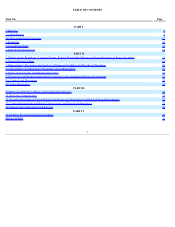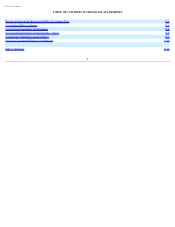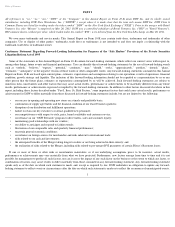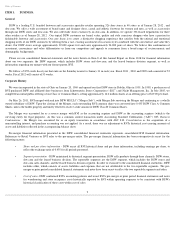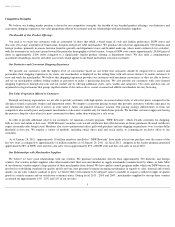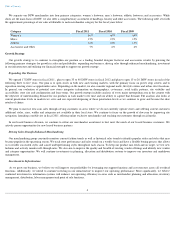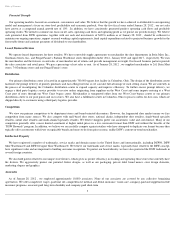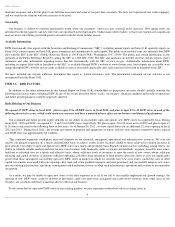DSW 2011 Annual Report Download - page 14
Download and view the complete annual report
Please find page 14 of the 2011 DSW annual report below. You can navigate through the pages in the report by either clicking on the pages listed below, or by using the keyword search tool below to find specific information within the annual report.
Table of Contents
proceeds may not be paid timely.
Our failure to retain our existing senior management team and to continue to attract qualified new personnel could adversely affect our business.
Our business requires disciplined execution at all levels of our organization to ensure that we continually have sufficient inventories of assorted
brand name merchandise at attractive retail prices. This execution requires an experienced and talented management team. If we were to lose the
benefit of the experience, efforts and abilities of any of our key executive and buying personnel, our business could be materially adversely affected.
We have entered into employment agreements with several key executives. Furthermore, our ability to manage our retail expansion will require us to
continue to train, motivate, compensate and manage our employees and to attract, motivate and retain additional qualified managerial and
merchandising personnel. Competition for these types of personnel is intense, and we may not be successful in attracting and retaining the personnel
required to grow and operate our business.
We may be unable to compete favorably in our highly competitive market.
The retail footwear market is highly competitive with few barriers to entry. We compete against a diverse group of retailers, both small and large,
including department stores, mall-based shoe stores, national chains, independent shoe retailers, single-
brand specialty retailers, online shoe retailers,
multi-channel specialty retailers and brand-
oriented discounters. Our success depends on our ability to remain competitive with respect to style, price,
brand availability and customer service. The performance of our competitors, as well as a change in their pricing policies as a result of the current
economic environment, marketing activities and other business strategies, could have a material adverse effect on our business.
We are dependent on our “DSW Rewards” program to drive traffic, sales and loyalty.
“DSW Rewards” is a customer loyalty program that we rely on to drive customer traffic, sales and loyalty. “DSW Rewards”
members earn reward
certificates that offer discounts on future purchases. In fiscal 2011 , shoppers in the loyalty program generated approximately 88%
of DSW store and
dsw.com sales versus approximately 87% of DSW store and dsw.com sales in fiscal 2010 . As of January 28, 2012 , approximately
18 million
members enrolled in “DSW Rewards” have made at least one purchase over the course of the last two fiscal years, compared to approximately
16
million members as of January 29, 2011 . In the event that our “DSW Rewards”
members do not continue to shop at DSW or the number of members
decreases, could have a material adverse effect on our business.
Uncertain economic conditions in the United States and other world events can adversely affect consumer confidence and consumer spending
habits.
Consumer spending habits, including spending for the footwear and related accessories that we sell, are affected by, among other things, prevailing
economic conditions, levels of employment, salaries and wage rates, prevailing interest rates, income tax rates and policies, consumer confidence and
consumer perception of economic conditions. In addition, consumer purchasing patterns may be influenced by consumers’
disposable income.
Consumer confidence is also affected by the domestic and international political situation. The outbreak or escalation of war, natural disasters, or the
occurrence of terrorist acts or other hostilities
in or affecting the United States, could lead to a decrease in spending by consumers. In an economic
slowdown, we could experience lower net sales than expected on a quarterly or annual basis and be forced to delay or slow our expansion plans.
Reduced net sales may result in reduced operating cash flows if we are not able to appropriately manage inventory levels or leverage expenses. These
negative economic conditions could have a material adverse effect on our business.
We rely on foreign sources for our merchandise, and our business is therefore subject to risks associated with international trade.
We purchase merchandise from domestic and foreign vendors. In addition, many of our domestic vendors import a large portion of their
merchandise from abroad, primarily from China, Brazil and Italy. We believe that almost all the merchandise we purchased during fiscal 2011
was
manufactured outside the United States, and the majority was manufactured in China. For this reason, we face risks inherent in purchasing from
foreign suppliers, such as: economic and political instability in countries where these suppliers are located; international hostilities or acts of war or
terrorism affecting the United States or foreign countries from which our merchandise is sourced; increases in shipping costs; transportation delays and
interruptions, including increased inspections of import shipments by domestic authorities; work stoppages; U.S. laws affecting the importation of
goods, including duties, tariffs and quotas and other non-
tariff barriers; expropriation or nationalization; changes in foreign government administration
and governmental policies; changes in import duties or quotas; compliance with trade and foreign tax laws; and local business practices, including
compliance with foreign laws and with domestic and international labor standards.
9


